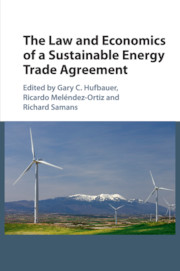Book contents
- The Law and Economics of a Sustainable Energy Trade Agreement
- The Law and Economics of a Sustainable Energy Trade Agreement
- Copyright page
- Contents
- Figures
- Tables
- Boxes
- Contributors
- Selected Abbreviations and Acronyms
- Foreword: Trade Policy Can Help Combat Climate Change
- Book part
- 1 Introduction: Setting the Horse Before the Cart to Preserve a Viable World
- 2 Issues and Considerations for Negotiating a Sustainable Energy Trade Agreement: May 2012
- 3 Trade in Sustainable Energy Services: October 2013
- 4 Governing Clean Energy Subsidies: What, Why, and How Legal?: August 2012
- 5 Trade Law Implications of Procurement Practices in Sustainable Energy Goods and Services: September 2012
- 6 Selling the Sun Safely and Effectively: Solar Photovoltaic Standards, Certification Testing and Implications for Trade Policy: December 2013
- 7 Addressing Local Content Requirements in a Sustainable Energy Trade Agreement: June 2013
- 8 International Technology Diffusion in a Sustainable Energy Trade Agreement: September 2012
- 9 Legal Options for a Sustainable Energy Trade Agreement: July 2012
- Index
- References
9 - Legal Options for a Sustainable Energy Trade Agreement: July 2012
Published online by Cambridge University Press: 05 August 2016
- The Law and Economics of a Sustainable Energy Trade Agreement
- The Law and Economics of a Sustainable Energy Trade Agreement
- Copyright page
- Contents
- Figures
- Tables
- Boxes
- Contributors
- Selected Abbreviations and Acronyms
- Foreword: Trade Policy Can Help Combat Climate Change
- Book part
- 1 Introduction: Setting the Horse Before the Cart to Preserve a Viable World
- 2 Issues and Considerations for Negotiating a Sustainable Energy Trade Agreement: May 2012
- 3 Trade in Sustainable Energy Services: October 2013
- 4 Governing Clean Energy Subsidies: What, Why, and How Legal?: August 2012
- 5 Trade Law Implications of Procurement Practices in Sustainable Energy Goods and Services: September 2012
- 6 Selling the Sun Safely and Effectively: Solar Photovoltaic Standards, Certification Testing and Implications for Trade Policy: December 2013
- 7 Addressing Local Content Requirements in a Sustainable Energy Trade Agreement: June 2013
- 8 International Technology Diffusion in a Sustainable Energy Trade Agreement: September 2012
- 9 Legal Options for a Sustainable Energy Trade Agreement: July 2012
- Index
- References
- Type
- Chapter
- Information
- The Law and Economics of a Sustainable Energy Trade Agreement , pp. 390 - 455Publisher: Cambridge University PressPrint publication year: 2016
References
Primary Sources
Secondary Sources
- 1
- Cited by



